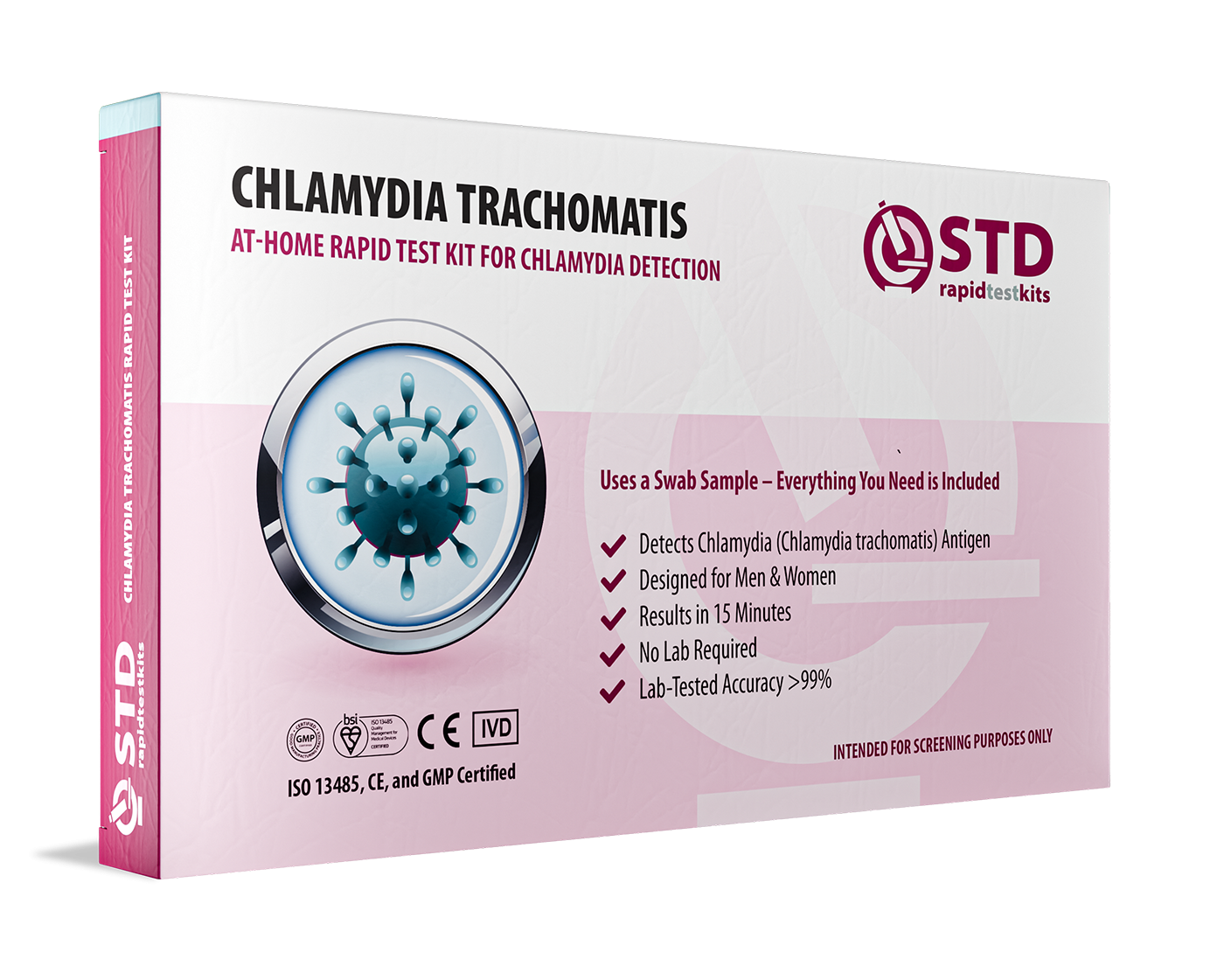Think Oral Sex Is Safe? These 6 STDs Say Otherwise
What Is Oral Chlamydia? A Sexually Transmitted Throat Infection
Chlamydia is typically labeled as a genital infection, but that’s outdated thinking. It’s caused by a bacterium called Chlamydia trachomatis, which doesn’t discriminate between body parts. If it comes into contact with moist mucous membranes, the kind lining your mouth and throat, it can absolutely set up shop there.
That means if you give oral sex to someone who’s infected, you can get chlamydia in your mouth. If they ejaculate, if there’s vaginal fluid, or even skin-to-skin contact with an infected area, that bacterium has all the access it needs. No penetration required. No orgasm necessary.
And yet, many people, including doctors, still think of oral sex as the "safer" alternative. Technically, the risk is lower compared to unprotected penetrative sex, but "lower" does not mean zero. This false sense of security is exactly why oral chlamydia spreads quietly, especially in younger people who consider oral sex "not really sex."
How Chlamydia Ends Up in Your Throat
It doesn’t take much. You can get oral chlamydia from:
Giving unprotected oral sex (to a penis or vulva)
Sharing sex toys that haven’t been properly cleaned
Kissing after oral sex if infected fluids are involved
Receiving oral sex from someone with chlamydia in their mouth
Once inside your throat, the bacteria do what bacteria do best: multiply quietly. They dig into your mucous membranes, usually without causing any immediate alarm. That’s what makes this infection so dangerous, it’s sneaky. The symptoms (if you even have them) are vague. And even if they show up, they’re often mistaken for a mild cold, allergies, or a sore throat. In other words: it’s easy to catch and hard to notice.
Check Your STD Status in Minutes
Test at Home with RemediumChlamydia Test Kit

 For Men & Women
For Men & Women Results in Minutes
Results in Minutes No Lab Needed
No Lab Needed Private & Discreet
Private & DiscreetOrder Now $33.99 $49.00
What Oral Chlamydia Actually Feels Like
If you’ve got chlamydia in your throat, you may have zero symptoms at all. Seriously, nothing. This is why it spreads so easily and why people often go untreated for months or even years. When symptoms do show up, they tend to be underwhelming, which leads to misdiagnosis or total dismissal. You might experience:
A persistent sore throat that doesn’t respond to lozenges or rest
Redness or swelling in the back of the throat
Pain when swallowing, especially without any nasal congestion
Mild fever or swollen lymph nodes under the jaw
Patches of pus or irritation on the tonsils, resembling strep throat
The problem is that these symptoms are identical to common illnesses. Most people treat them with OTC cold meds or ignore them entirely. Even doctors might misread it as viral pharyngitis, prescribe amoxicillin, and send you on your way, never realizing the bacteria causing it is chlamydia. So yes, oral chlamydia feels like a sore throat, but one that lingers, dodges treatment, and doesn’t quite add up.
Why It’s So Often Missed
The main reason oral chlamydia flies under the radar is simple: doctors rarely test for it. Unless you specifically ask for a throat swab for chlamydia, it won’t be part of your standard STD screening.
Many providers assume oral sex is “low-risk.” They might test your genitals, maybe your blood, but your throat? Often skipped.
That means if you contracted chlamydia from giving oral sex, you could walk away with a negative test result, even though the infection is alive and well in your body.
This is a major blind spot in sexual health care. It also means if you’ve been tested recently and came back clean, you could still have oral chlamydia right now, especially if oral sex was your only exposure point.
What Happens If You Don’t Treat Oral Chlamydia
Chlamydia, whether it’s in your throat or your genitals, doesn’t just sit there politely. It spreads. It evolves. It climbs. And when it goes untreated, the consequences aren’t just uncomfortable, they can be permanent.
While oral chlamydia itself may not seem dangerous at first, the longer it stays in your system, the more likely it is to spread to other parts of the body, or to be passed to others unknowingly. You can transmit it back to your partner's genitals during oral sex. You can reinfect yourself. You can become a carrier without knowing it.
If you’re already immunocompromised, oral chlamydia can escalate faster, potentially leading to more serious bacterial infections or co-infections like gonorrhea, herpes, or even HIV, because the inflammation it causes in your throat creates a gateway for other STDs to enter your bloodstream more easily.
There’s also the risk of autoinoculation. That’s a fancy word for when an infection spreads from one part of your body to another, like from your throat to your eyes, if you're rubbing your mouth and then touching your face. Eye chlamydia is a real thing. And it can cause conjunctivitis that antibiotics won’t touch unless it’s specifically treated.
Most dangerously, untreated chlamydia can invade deeper tissues, and although it’s rare, untreated oral infections have led to cases of lymphatic inflammation, ear infections, and systemic bacterial spread in people who never realized what they were dealing with.
Check Your STD Status in Minutes
Test at Home with Remedium10-in-1 STD Test Kit

 For Women
For Women Results in Minutes
Results in Minutes No Lab Needed
No Lab Needed Private & Discreet
Private & DiscreetOrder Now $189.00 $490.00
For all 10 tests
How to Test for Chlamydia in the Mouth (Hint: You Have to Ask)
Here’s the truth most clinics won’t tell you unless you ask directly: oral chlamydia requires a specific test, a throat swab that targets chlamydia DNA in the tissue of the mouth and tonsils. If your provider only runs a urine test or genital swab, they’re only looking for chlamydia in one part of your body. So if you had oral sex, and that’s the only exposure you’re worried about, but no one tested your throat? That “negative” result doesn’t mean a damn thing.
You can request a throat swab at a sexual health clinic, but not all places offer it. That’s why many people turn to at-home STD kits, especially ones that let you swab your own throat and mail it in discreetly for lab analysis. No awkward conversations, no misdiagnosis, no chance of being overlooked because your provider doesn’t think “that’s where it could be.”
If you’ve had unprotected oral sex, especially with a new partner or someone whose status you don’t know, get tested specifically for oral chlamydia. If your throat’s been sore for more than a few days and your strep test was negative? Consider the possibility you’ve got something more stealthy going on.
How It’s Treated (And Why You Need to Tell Your Partner)
The good news is that oral chlamydia is treatable, and usually pretty easily. A standard course of antibiotics, typically doxycycline or azithromycin, clears it in most cases. The key is taking the full dosage, avoiding sex during treatment, and getting retested afterward to make sure it’s really gone.
But what most people skip? Telling their partner. If you tested positive in your throat, there’s a strong chance the person you were with has chlamydia in their genitals, or vice versa. If you don’t both get treated, you’ll just pass the infection back and forth like a toxic ping-pong match.
This is especially common in couples who believe they’re “monogamous” or “clean” because one test came back negative. If only one of you gets tested, and the wrong part of the body was swabbed, you’re missing half the story.
Why Oral Chlamydia Is a Bigger Deal Than People Realize
Most people shrug off oral sex as a low-risk activity. It's the thing teenagers do when they're “not ready,” the alternative in hookup culture to avoid pregnancy, or the casual exchange that doesn’t “count” as cheating. But when it comes to oral STDs like chlamydia, that mindset is part of the problem.
Here’s why oral chlamydia is more serious than people think:
First, it’s a public health blind spot. Testing guidelines in many countries still don’t mandate or recommend regular throat swabs for chlamydia unless you’re in a high-risk group, like men who have sex with men. This leaves heterosexual and bisexual individuals massively under-screened.
Second, it’s understudied and underreported. Most STD surveillance systems don’t track pharyngeal chlamydia cases separately. That means we don’t actually know how many people are walking around with it, how long it typically lingers, or what percentage of those cases progress into more serious infections. What we do know is that in studies where throat testing was done, positivity rates were shockingly high, and in many cases, the individuals had no symptoms at all.
Third, oral chlamydia might be playing a hidden role in antibiotic resistance. Because the throat is a warm, wet environment with lots of bacterial neighbors, it’s a breeding ground for bugs to trade resistance genes. That makes treating it a little trickier, especially if someone has been previously misdiagnosed and given ineffective antibiotics.
And finally, the stigma around oral STDs makes them easy to ignore. People don’t want to admit they got sick from a blowjob. It doesn’t fit the “dirty” or “promiscuous” narrative society assigns to STDs. But the bacteria doesn’t care. It’s not about your sex life. It’s about biology.
What to Do If You Think You’ve Got It
If you’re reading this with a scratchy throat, a guilty conscience, or a queasy feeling about that last hookup, here’s what to do next:
Don’t panic. Oral chlamydia is treatable and won’t kill you if caught early. But you do need to act.
Get tested, and specifically request a throat swab for chlamydia. Don’t assume a urine test covers it.
Use an at-home kit if you’re embarrassed, anxious, or just want to stay private. STD Rapid Test Kits offers discreet, lab-grade testing for oral infections.
Tell your partner(s). Even if you don’t want to. Even if you’re not sure. If they’re infected, they need treatment too.
Follow through with treatment. Don’t skip pills, don’t resume sex too soon, and definitely don’t assume you’re cured without confirmation.
Check Your STD Status in Minutes
Test at Home with Remedium7-in-1 STD Test Kit

 For Men & Women
For Men & Women Results in Minutes
Results in Minutes No Lab Needed
No Lab Needed Private & Discreet
Private & DiscreetOrder Now $129.00 $343.00
For all 7 tests
10 FAQ
1. Can you really get chlamydia in your mouth?
Yes. It’s transmitted through oral sex and infects the throat just like it would genitals.
2. Does oral chlamydia have symptoms?
Sometimes. Sore throat, redness, trouble swallowing, or no symptoms at all.
3. Is it dangerous if untreated?
Yes. It can spread to other areas, lead to serious infections, and increase the risk of other STDs.
4. Will a regular STD test detect it?
Not unless a throat swab is included. You have to ask for it or use an at-home oral-specific kit.
5. How do I know if my sore throat is chlamydia or just a cold?
You don’t, unless you test. Chlamydia mimics a normal sore throat but doesn’t go away easily.
6. Can I kiss someone and give them oral chlamydia?
It’s not the most common transmission route, but it's theoretically possible with open sores or direct exposure.
7. Can I get it from receiving oral sex?
Possibly, if the person performing oral has chlamydia in their mouth. The risk is lower, but not zero.
8. What’s the treatment?
Usually a course of antibiotics, doxycycline is the current gold standard. Follow all instructions carefully.
9. Can I reinfect myself or my partner?
Yes. If only one of you is treated, or if you resume sex too soon, you can ping-pong the infection back and forth.
10. Can I test for oral chlamydia at home?
Yes, with a throat-swab kit from STD Rapid Test Kits or other reputable at-home testing services.
Your Throat Might Be Lying to You
Don’t trust a clean bill of health if no one looked at your throat. Don’t assume you’re safe because you’ve got no symptoms. And definitely don’t think oral sex is risk-free just because you didn’t technically “have sex.” Oral chlamydia is real. It’s common. It’s contagious. And it doesn’t care how clean you think your last hookup was.
So if your throat has been acting strange, or if you’ve had unprotected oral sex and never tested for it? Don’t guess. Don’t wait. Get tested now, privately, safely, and from home, with STD Rapid Test Kits. You might already have it. But now you don’t have to.
Sources
1.- Mayo Clinic: Chlamydia trachomatis - Symptoms and causes
2.- MedlinePlus: Chlamydia Infections
4.- NCBI Bookshelf: Chlamydia - StatPearls
5.- PubMed Central: Pharyngeal Chlamydia trachomatis is not uncommon any more










